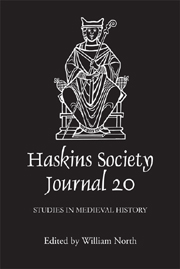Book contents
- Frontmatter
- Contents
- Editor's Note
- Abbreviations
- 1 Buckets, Monasteries, and Crannógs: Material Culture and the Rewriting of Early Medieval British History
- 2 Punishing Bodies and Saving Souls: Capital and Corporal Punishment in Late Anglo-Saxon England
- 3 Writing Latin History for a Lay Audience c. 1000: Dudo of Saint Quentin at the Norman Court
- 4 Between Neighbors and Saints: Waleran I of Meulan and the Allegiance of Lesser Lords in the Eleventh Century
- 5 Who Founded Durtal? Reconsidering the Evidence
- 6 Robert Curthose: Ineffectual Duke or Victim of Spin
- 7 The Chivalric Transformation and the Origins of Tournament as seen through Norman Chroniclers
- 8 An Internal Frontier? The Relationship between Mainland Southern Italy and Sicily in the ‘Norman’ Kingdom
- 9 ‘Hywel in the World’
- 10 Prices, Price Controls, and Market Forces in England under Edward I c. 1294–1307
7 - The Chivalric Transformation and the Origins of Tournament as seen through Norman Chroniclers
Published online by Cambridge University Press: 12 September 2012
- Frontmatter
- Contents
- Editor's Note
- Abbreviations
- 1 Buckets, Monasteries, and Crannógs: Material Culture and the Rewriting of Early Medieval British History
- 2 Punishing Bodies and Saving Souls: Capital and Corporal Punishment in Late Anglo-Saxon England
- 3 Writing Latin History for a Lay Audience c. 1000: Dudo of Saint Quentin at the Norman Court
- 4 Between Neighbors and Saints: Waleran I of Meulan and the Allegiance of Lesser Lords in the Eleventh Century
- 5 Who Founded Durtal? Reconsidering the Evidence
- 6 Robert Curthose: Ineffectual Duke or Victim of Spin
- 7 The Chivalric Transformation and the Origins of Tournament as seen through Norman Chroniclers
- 8 An Internal Frontier? The Relationship between Mainland Southern Italy and Sicily in the ‘Norman’ Kingdom
- 9 ‘Hywel in the World’
- 10 Prices, Price Controls, and Market Forces in England under Edward I c. 1294–1307
Summary
The period culminating in the eleventh century has bequeathed to us a range of narratives that describe the heroic deeds of noble young heroes who determinedly served their nation, lord, faith, or kindred. They fought for important and collective stakes of honor, interest, or both. If they died in battle, they were honored for their courage, and their death called for revenge. If they won, they gained valuable rewards: an enhanced status, an inheritance, a wife, a fief, glory. Such is the fate of the legendary Ingo described by Richer of Reims in his Histories; the same author also speaks of a more historical (albeit anonymous) warrior who obtained a reward for killing a German giant in single combat. Richer's book reveals some of the tales that were current within the noble households of tenth-century Frankish kings, a milieu to which Richer's own father, Ralph, belonged.
Richer's father could pride himself, in the second half of the tenth century, on having succeeded in some dangerous and decisive actions, even if they were rather covert and underhand. Yet evidence suggests that even at this time nobles seldom died in battle or during campaigns between French principalities. They deferred to the implicit norms of intracultural ‘war’ which directed them to avoid killing one another and to spare their noble enemies, with the expectation of gaining the success they desired through pleas, the mechanisms of social life, and by gaining the loyalty of their supporters.
- Type
- Chapter
- Information
- The Haskins Society Journal 202008 - Studies in Medieval History, pp. 141 - 160Publisher: Boydell & BrewerPrint publication year: 2009



